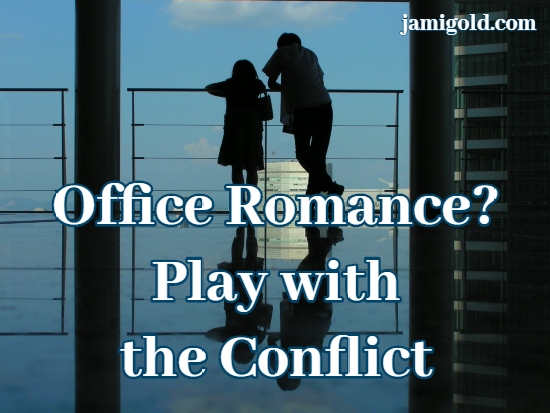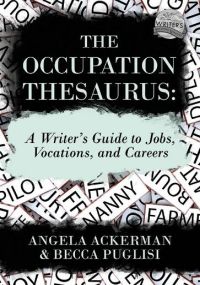Writing Conflict: Love, Work, and Office Romance — Guest: Angela Ackerman

As I announced a few weeks ago, the dynamic duo of Angela Ackerman and Becca Puglisi recently released their latest entry into their Thesaurus series: The Occupation Thesaurus. Like their popular Emotion Thesaurus and other Thesaurus books, the lists in The Occupation Thesaurus include many writing tips.
For example, each occupation listed in this latest release offers ideas for how we can twist the stereotypes for their job:
- Should our character have different motivations than usual?
- Should they have an opposite personality from what’s expected?
- Should they have acquired their skills or knowledge in an unusual way?
Each occupation also lists potential sources of friction within the job, and as we all know, conflict is important in our stories. However, beyond job-specific friction, some types of conflict can be found with any job, such as if our story features an office—or any type of workplace—romance.
Yet even with our conflict, we still want to do what we can to twist stereotypes and keep our story feeling unique. Luckily, The Occupation Thesaurus co-author Angela Ackerman is here today to share her tips on conflict, relationships, and twisting an office romance to improve our story.
Please welcome Angela Ackerman! *smile*
*****
Twisting the “Office Romance” Into Something Fresh
By Angela Ackerman
Have you ever gone to a new restaurant, ordered a burger, and discovered it has some sort of luscious, zippy sauce that elevates the entire meal into the ecstasy zone? Amazing, right?
Well, Becca and I call conflict a story’s “secret sauce” because it does the same thing – elevates the situation in a way that makes the reading experience even better.
Conflict = Uncertainty = Reader Interest
Conflict represents a problem, struggle, or challenge, that suddenly renders the outcome uncertain. And when you take certainty away, readers worry…and that keeps them flipping pages until the world evens out again.
Good writers make sure to prolong that uncertainty as long as possible, creating an uphill battle for the protagonist as he or she climbs toward what they want most: their goal in the story.
Ah, delicious conflict. It gets the blood pumping and we’re always looking for ways to add more of it. Sure, part of it is that we writers are a little evil, but it also ups the ante.
Relationships + Work = More Conflict
Thankfully, a character’s occupation is ripe with opportunities for clashes and upset, especially when it comes to their relationships with other people. Relationship friction comes in a thousand flavors: power struggles among competitive employees, or between the boss and her subordinate.
Relationships and conflict are both great sources of emotion for our stories. Strengthen your ideas with @AngelaAckerman's tips Click To TweetMaybe your character spends too much time at work and so relationship struggles happen on the home front because their spouse is shouldering the biggest load when it comes to the kids. And speaking of those sticky, jelly-handed darlings…what happens when Mom has to stay home and take care of little Jimmy who jumped off the shed and broke his ankle the same day she’s supposed to present the budget to the executive team at work?
There are so many ways that a character’s personal life can collide with their professional one, resulting in painful fireworks. Today let’s look at one specific type of relationship conflict straight from The Occupation Thesaurus: A Writer’s Guide to Jobs, Vocations, and Careers.
The Land of Bad Decisions: Workplace Romances
A common trope in fiction is the office romance, when the lines between personal and professional relationships blur. Long, late nights trying to meet a deadline or a desire to cut loose at the conclusion of a successful project can lead to bad decisions, such as an impromptu tryst with a co-worker or inviting the boss’s hunky assistant into the boardroom for something other than dictation.
Office romances are usually forbidden for good reason—they produce unwanted drama. And when the sparks inevitably fizzle, everyone else may need chainsaws to cut the tension, which could undermine the unity and teamwork needed for your character to achieve her goals.
Office Romance Conflicts
Another problem with these relationships is that both parties don’t always end up on the same page. For one, the break room booty is all fun and games, but for the other it may become serious.
If a careless “I love you” or “When are you going to leave your husband?” spills out, a cold breeze might blow in. The lovestruck whispers change to “We should really stop” and “This was fun, but let’s keep it professional from here on out.”
Heartbreak is never easy, but when you’re forced to see and work with the person who discarded you, it can lead to resentment, anger, and the desire for revenge.
Office Romances: Stereotypes and Twists
With bad breakups at work, the possibilities are endless for delicious conflict. Some staples, such as career sabotage, blackmail, and threats to tell the wife, are often used because they work. But instead of replaying the same old recording, add a twist that readers haven’t seen.
How can we avoid cliches in our story's workplace romance? @AngelaAckerman shares tips! Click To TweetWhat if the jilted love interest threatens to tell the boss’s angst-ridden teenage kid instead of his wife? Ouch. And it would take a special kind of vengefulness to bypass family members and hand evidence of the affair to the chin-waggers at his church.
Sharpen your imagination to come up with creative ways to get even and remember that sometimes small cuts cause the most damage.
4 Ways to Twist the Office Romance Conflict
No matter what type of relationship friction you’re playing with, stretch yourself to think of ways to make that conflict scenario fresh:
- Twist the Same-Old:
What types of relationships at work would be forbidden, and why? - Raise the Stakes:
What if an employee is not just getting it on with the boss, but also the boss’s wife? - Introduce a Puppeteer:
What if the office romance is a set up from the get-go, perhaps orchestrated by one brother who doesn’t want to see his sister take over the company. Only she sees it coming and becomes the puppeteer… - Deliver the Unexpected:
Office romances often explode, sending shrapnel in all directions. What if it the opposite happens and instead leads to a shocking happily ever after?
Don’t be afraid to get creative, and if there is fallout, make it count. Drop your character from the trapeze with no safety net in sight.
If you want more ideas for work-related conflict (and you know you do), check out The Occupation Thesaurus: A Writer’s Guide to Jobs, Vocations, and Careers. And to see one of the jobs we profile, zip over to this entry on FIREFIGHTERS.
*****

Angela Ackerman is a writing coach, international speaker, and co-author of the bestselling book, The Emotion Thesaurus and its many sequels. Her books are available in eight languages, are sourced by US universities, recommended by agents and editors, and are used by novelists, screenwriters, and psychologists around the world. To date, this book collection has sold over half a million copies.
Angela is also the co-founder of the popular site Writers Helping Writers, as well as One Stop for Writers, a portal to game-changing tools and resources that enable writers to craft powerful fiction. Her mission is to make writing easier for everyone.
Facebook | Twitter | Instagram
*****
About The Occupation Thesaurus:
Whether a person loves or hates what they do, a job can reveal many things, including their priorities, beliefs, desires, and needs. The Occupation Thesaurus will show you how a career choice can characterize, drive the plot, infuse scenes with conflict, and get readers on the character’s side through the relatable pressures, responsibilities, and stakes inherent with work.
Select a job that packs a powerful punch. Inside The Occupation Thesaurus, you’ll find:
- Informative profiles on popular and unusual jobs to help you write them with authority
- Instruction on how to use jobs to characterize, support story structure, reinforce theme, and more
- An in-depth study on how emotional wounds and basic human needs may influence a character’s choice of occupation
- A brainstorming tool to organize the various aspects of your character’s personality so you can come up with the best careers for them
Choose a profession for your character that showcases who they are, what they want, and what they believe in. With over 120 entries in a user-friendly format, The Occupation Thesaurus is an entire job fair for writers.
Amazon | Indigo | iBooks | Kobo | B&N | Smashwords | PDF
*****
Thank you, Angela! As you point out, conflict is necessary for our story, and our character’s job can be a source of conflict in many different ways (relationships with others, moral issues, etc.). While any one choice might make our story feel cliché, mixing and matching multiple options for conflict can make our story feel more unique.
In my genre of romance, happily ever afters (HEAs) aren’t a twist on the office romance stereotypes (as HEAs are expected), but other conflict choices can make the road to get to that happy ending unexpected. For example, in the story I’m reading now, The Worst Best Man by Mia Sosa, the heroine is working with her ex-fiance’s brother—and the brother is the one who broke them up…at the altar.
So let’s see… The love-interest brother is responsible for her old heartbreak and humiliation, he’s the ex’s brother (with all the forbidden aspects that entails), he has his own set of issues with his brother (that are muddling up his relationship motivations), their work project is a competition with her ex, she desperately needs to win the competition to keep her business going, and so on. Added together, those varied conflict elements create a unique story with an unpredictable path to the HEA.
We can do the same with our stories, no matter our genre. The more conflict we layer in, from our character’s job, their boss, their coworkers, their motivations and/or goals, their personal life, their backstory wound, their fears, etc., the more readers won’t be able to predict our story’s twists—or put it down before they reach the last page. *smile*
Do you struggle to think of how to twist stereotypes? Or to add enough conflict? Does it make sense how we can mine our character’s job for more conflict ideas? Or how adding more conflict layers can help make our story more unique? Do you have any questions for Angela?
Pin It

Thank you so much for the welcome, Jami! I always love posting here. And you are right–there are so many imaginative ways we can rework office romance conflict (or any conflict) and that’s really the best aspect of how a writer’s mind works. Our imaginations tend to run in different directions, meaning a swath of interesting story paths we can take the reader! <3
Thanks so much for sharing your insights and advice with all of us, Angela. You’re the best! 😀
🙂 (MEGA HUGS)
[…] but also to characterize and showcase their deeper layers, provide hints to a past emotional wound, generate relationship conflict and […]
[…] Looking at a storyline where Romance happens in the workplace? Don’t miss this post on all the conflict options you can play with. […]